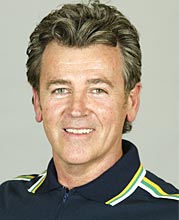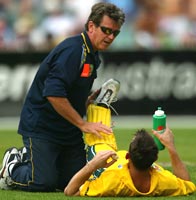Home > Cricket > Column > Darshak Mehta
Hooter, silent but suave
October 07, 2003
'When the Hooter Blows' is supposed to be the title of Errol Alcott's long-threatened book. He is the Australian cricket team's physiotherapist and is amongst the most recognised faces in the community of international cricketers. He is known in Australian cricketing circles as 'Hooter'.
 The story goes that when he was appointed physio for his first cricket game and the fielding team went out at the start of the match, he asked someone, "Hey, how do they know it is time to go out? Don't they have a hooter or something?"
The story goes that when he was appointed physio for his first cricket game and the fielding team went out at the start of the match, he asked someone, "Hey, how do they know it is time to go out? Don't they have a hooter or something?"
Since then, the nickname has stuck!
Australians take great -- and I suspect, a rather perverse -- delight in nicknaming all and sundry! Hardly anyone escapes this quaint though quintessential Aussie practice.
Alcott is one man who has been an integral part of the Australian cricket team since 1984. He's seen it all at close quarters -- point blank range, in fact. He's the cog that oils the wheels of the Australian juggernaut, I reckon. Perhaps, the only indispensable member of the team!
Though he has been in the job for over 19 years now, not much is publicly known of him or about him. He is, for all intents and purposes, the silent, invisible operator -- the only time when you see him on television is when an Australian player is injured or ill on the field. Now and then, he may brief the media about the injuries to various players.
Alcott was a good rugby league player in his youth -- a powerfully built front rower. A bit surprising, as he went to a private school. In Australia, not a lot of private schoolboys play 'league' -- 'Union' is their game of choice. He would have a lot of very interesting and extremely colourful stories to tell. It would be a unique eyewitness account and definitive history of the Australian cricket dressing rooms of the past two decades! I very much doubt that he ever will. He is notoriously reticent to open up. That is the nature of the man. His lips are permanently sealed and he is highly unlikely to ever betray personal confidences.
Once the match begins there is no one busier than him. The sights I can't easily forget are the times just before the Aussies go on to the field. The atmosphere in the dressing room is tense. Alcott is usually strapping up the fast bowlers (a couple of them with surprisingly fragile physiques and a litany of injuries). During breaks he is vigorously massaging the bowlers (or batsmen who have been having a long innings).
I have seen him put Humpty-Dumties together time and again, back on the park after their many great falls.
Steve Bernard the manager of the Australian cricket team tells the story about the time in Madras in March 2001 when Alcott told him that something did not quite look right with Jason ['Dizzy']Gillespie's run-up. He saw 'Dizzy' and manipulated his calf and said that's sore isn't it? 'Dizzy' sheepishly agreed -- he did not want to make a fuss or continue to be seen as injury prone or effect the morale of the team and preferred to gallantly carry on.
But, Alcott did not miss it and, in fact, advised him not to play the One-Dayers and rest at home in Adelaide, instead.
Another incident that sheds light on his expertise was when, on a rare occasion, he was himself recovering from an injury. On leave, he saw Ricky Ponting run into an advertising hoarding at the SCG. Ponting was told by the experts in charge then that he would be okay within a week or two. Alcott saw him but did not proffer an opinion. He went up quietly to Steve Bernard and told him 'Punter' was f….. (add a colourful Australian colloquialism here!).
Indeed, Ponting was out of cricket for months and had to have ankle surgery.
 He is, of course, very highly respected by the players, but, as importantly, he is well-regarded by cricket administrators. Selectors often consult him on the quiet about the fitness (or otherwise!) of cricketers they are considering including in the side. He's astute, considered and even fastidious, says Steve Bernard. And he does not miss much. He has been known to run around with a thermometer and measure the temperature of food being heated up before being served to the players [has to be heated to at least 60 degree centigrade!] particularly, on the Indian sub-continent.
He is, of course, very highly respected by the players, but, as importantly, he is well-regarded by cricket administrators. Selectors often consult him on the quiet about the fitness (or otherwise!) of cricketers they are considering including in the side. He's astute, considered and even fastidious, says Steve Bernard. And he does not miss much. He has been known to run around with a thermometer and measure the temperature of food being heated up before being served to the players [has to be heated to at least 60 degree centigrade!] particularly, on the Indian sub-continent.
It is rumored that Alcott and [the then coach] Bobby Simpson virtually 'ran' an entire Ashes tour of England, as the anointed team manager was, as they say in Oz, hitting the turps hard [Drinking away].
Steve Waugh has known Alcott better than most as he has played all his international cricket with Alcott around as the physio. In fact, a lot of observers feel that without Alcott, Waugh would not have played a few of his Tests/ODIs.
I spoke to Waugh for this article and he described Alcott as "a street-smart, knowledgeable, hard-working, observant and intuitive guy". He recalled the tremendous hard work Alcott put in to get him [Waugh] fit during the last Ashes series – Waugh reckons that in the 19 days between the Trent Bridge and Oval Tests they were working around eight hours a day. Out of these eight hours, Alcott was manually working on Waugh's leg for at least four hours a day – all up nearly 80 hours!
The incident not only speaks volumes about Alcott but Waugh and his professionalism, determination and capacity for hard work!
Waugh added that at first Alcott didn't know much about cricket and was a great fan of the one-day game and the white ball -- he recalled Hooter's expression of "whooshkas" to describe the biff and bargy of ODIs. Waugh says that he's learned to appreciate the nuances of the longer version.
Not only does he know the bodies of his charges but he knows their minds, too. Spending hours with the players on the couch would make that inevitable. By now, he must be "a psychologist" (to quote Waugh, again) - if not a full-fledged shrink [psychotherapist]. After all, having half or fully naked cricketers on his couch getting a massage or treating injuries and sore bodies, kneaded and manipulated, would catch them off guard.
He has a wicked sense of humour. I remember the scene in the Bombay Test of the 2001 series when I was perplexed to see rows of little, empty, plastic bottles lined up at the sink and as the day went by they gradually got filled with urine? Finally, my curiosity got the better of me, and I asked 'Hooter' what was the purpose: 'Drug Testing,' he said, with a straight face. My jaw fell.
"You're kidding," I said. 'Of course,' he said.
The real reason was that players could see the colour of their urine and ensure that they were re-hydrating and keeping up their fluid intake. Alcott believed that this was most essential on tours of the sub-continent to play at peak fitness.
One of the seminal events in Australian touring history is the Dean Jones dehydration experience in the memorable tied Test of Madras, 17 years ago.
Alcott told me that he remembers doing a 'rustic' study in which he recorded players as losing up to three-and-a-half kilos in a session!
Some say that Jones might have done himself a lot more damage if Alcott had not recognised early on in the piece that he was suffering from extreme dehydration. Jones made 210 in about eight-and-a-half hours in the 40 degree-plus searing September heat with over 85 per cent humidity. He lost eight kilos in weight during that match and said he could not stop himself from urinating in his trousers during that innings.
I don't think Alcott has yet forgiven Jones after all that, for forgetting to invite him to the tied Test [Festival] re-match in Madras in March 2001, nor has David Gilbert, the 12th man, [now, CEO of Cricket NSW], who was literally run off his feet in that match!
Andrew Leipus is amongst the best things to have happened to Indian cricket and it is no coincidence that the quality of India's out-cricket and the fitness of Indian cricketers has improved beyond belief under his supervision.
A good physio is a precious resource, and Australia recognised that early on in Errol Alcott' s career. The BCCI must use Leipus's talents the way the Australians have, and treat him with the greatest courtesy, respect and dignity.